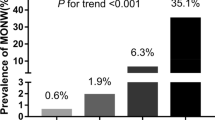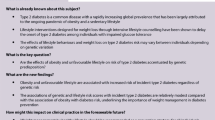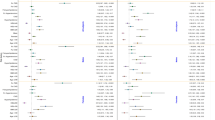Abstract
The anti-inflammatory adipokine intelectin-1, which is encoded by the ITLN1 gene, is hypothesized to be linked to the pathogenesis of type 2 diabetes (T2DM) and obesity. The purpose of this study was to examine the effect of the ITLN1 gene polymorphism rs2274907 on obesity and T2DM in Turkish adults. The impact of genotype on lipid profiles and serum intelectin levels in the obese and diabetes groups was also investigated. Randomly selected 2266 adults (mean age, 55.0 ± 11.7 years; 51.2% women) participating in the population-based Turkish adult risk factor study were cross-sectionally analyzed. The genotyping of rs2274907 A > T polymorphism was performed by using the hybridization probe based LightSNiP assay in real-time PCR. T2DM were defined using the criteria of the American Diabetes Association. Obesity was described as Body mass index ≥ 30 kg/m2. Statistical analyses were used to investigate the association of genotypes with clinical and biochemical measurements. According to findings, there was no vital connection between the rs2274907 polymorphism and obesity, T2DM, or serum intelectin-1 level. The TA+AA carriers had significantly higher triglyceride levels (p = 0.007) compared with the TT carriers in both obese and T2DM women when adjusted for relevant covariates. ITLN1 rs2274907 polymorphism is not correlated with the risk of obesity and T2DM and not affect serum ITLN1 levels in Turkish adults. However, this polymorphism appears to be important in regulating triglyceride levels in obese and diabetic women.

Similar content being viewed by others
Data Availability
No dataset used.
Abbreviations
- BMI:
-
Body mass index
- HDL-C:
-
High-density lipoprotein cholesterol
- ITLN1:
-
Intelectin-1
- LDL-C:
-
Low-density lipoprotein cholesterol
- T2DM:
-
Type 2 diabetes
- TARF:
-
Turkish adult risk factor
- TG:
-
Triglycerides
References
Abd-Elbaky AE, Abo-ElMatty DM, Mesbah NM, Ibrahim SM (2016) Omentin and apelin concentrations in relation to obesity, diabetes mellitus type two, and cardiovascular diseases in Egyptian population. Int J Diabetes Dev Ctries 36:52–58. https://doi.org/10.1007/s13410-015-0416-y
American Diabetes Association (2020) 2. Classification and diagnosis of diabetes: standards of medical care in diabetes-2020. Diabetes Care 43:S14-s31. https://doi.org/10.2337/dc20-S002
Auguet T, Quintero Y, Riesco D, Morancho B, Terra X, Crescenti A, Broch M, Aguilar C, Olona M, Porras JA, Hernandez M, Sabench F, del Castillo D, Richart C (2011) New adipokines vaspin and omentin. Circulating levels and gene expression in adipose tissue from morbidly obese women. BMC Med Genet 12:60. https://doi.org/10.1186/1471-2350-12-60
Bahadori M, Kohan L, Jafari N (2015) Association of assessment between Val109Asp omentin gene and obesity in Iranian women. Iran J Diabetes Metab 14:127–132
Boyle AP, Hong EL, Hariharan M, Cheng Y, Schaub MA, Kasowski M, Karczewski KJ, Park J, Hitz BC, Weng S (2012) Annotation of functional variation in personal genomes using RegulomeDB. Genome Res 22:1790–1797. https://doi.org/10.1101/gr.137323.112
Ensemble.org (2022). University. Cited 03.04.2022 2022
Gajewska J, Kuryłowicz A, Mierzejewska E, Ambroszkiewicz J, Chełchowska M, Weker H, Pietrzykowska M, Puzianowska-Kuźnicka M (2020) Are omentin rs2274907 and vaspin rs2236242 gene polymorphisms related to body composition, lipid profile and other adipokines in prepubertal healthy children? Endocr Res 45:24–31
Hardie DG (2003) Minireview: the AMP-activated protein kinase cascade: the key sensor of cellular energy status. Endocrinology 144:5179–5183
Isakova J, Talaibekova E, Vinnikov D, Aldasheva N, Mirrakhimov E, Aldashev A (2018) The association of Val109Asp polymorphic marker of intelectin 1 gene with abdominal obesity in Kyrgyz population. BMC Endocr Disord 18:15. https://doi.org/10.1186/s12902-018-0242-6
Khoshi A, Bajestani MK, Shakeri H, Goodarzi G, Azizi F (2019) Association of Omentin rs2274907 and FTO rs9939609 gene polymorphisms with insulin resistance in Iranian individuals with newly diagnosed type 2 diabetes. Lipids Health Dis 18:142. https://doi.org/10.1186/s12944-019-1085-5
Little J, Higgins JPT, Ioannidis JPA, Moher D, Gagnon F, von Elm E, Khoury MJ, Cohen B, Davey-Smith G, Grimshaw J, Scheet P, Gwinn M, Williamson RE, Zou GY, Hutchings K, Johnson CY, Tait V, Wiens M, Golding J, van Duijn C, McLaughlin J, Paterson A, Wells G, Fortier I, Freedman M, Zecevic M, King R, Infante-Rivard C, Stewart A, Birkett N (2009) Strengthening the reporting of genetic association studies (STREGA)-an extension of the STROBE statement. Genet Epidemiol 33:581–598. https://doi.org/10.1002/gepi.20410
Mrozikiewicz-Rakowska B, Sobczyk-Kopcioł A, Szymański K, Nehring P, Szatkowski P, Bartkowiak-Wieczorek J, Bogacz A, Aniszczuk A, Drygas W, Płoski R (2017) Role of the rs2274907 allelic variant of the ITLN1 gene in patients with diabetic foot. Pol Arch Intern Med 127:319–327
Muoio DM, Newgard CB (2008) Molecular and metabolic mechanisms of insulin resistance and β-cell failure in type 2 diabetes. Nat Rev Mol Cell Biol 9:193–205
Niersmann C, Carstensen-Kirberg M, Maalmi H, Holleczek B, Roden M, Brenner H, Herder C, Schöttker B (2020) Higher circulating omentin is associated with increased risk of primary cardiovascular events in individuals with diabetes. Diabetologia 63:410–418
Onat A (2001) Risk factors and cardiovascular disease in Turkey. Atherosclerosis 156:1–10. https://doi.org/10.1016/s0021-9150(01)00500-7
Onat A, Ademoglu E, Karadeniz Y, Can G, Uzun AO, Simsek B, Kaya A (2018) Population-based serum omentin-1 levels: paradoxical association with cardiometabolic disorders primarily in men. Biomark Med 12:141–149. https://doi.org/10.2217/bmm-2017-0197
Pan HY, Guo L, Li Q (2010) Changes of serum omentin-1 levels in normal subjects and in patients with impaired glucose regulation and with newly diagnosed and untreated type 2 diabetes. Diabetes Res Clin Pract 88:29–33
Paval DR, Di Virgilio TG, Skipworth RJE, Gallagher IJ (2022) The emerging role of intelectin-1 in cancer. Front Oncol 12:767859. https://doi.org/10.3389/fonc.2022.767859
Rathwa N, Patel R, Palit SP, Jadeja SD, Narwaria M, Ramachandran A, Begum R (2019) Circulatory Omentin-1 levels but not genetic variants influence the pathophysiology of Type 2 diabetes. Cytokine 119:144–151
Schäffler A, Zeitoun M, Wobser H, Buechler C, Aslanidis C, Herfarth H (2007) Frequency and significance of the novel single nucleotide missense polymorphism Val109Asp in the human gene encoding omentin in Caucasian patients with type 2 diabetes mellitus or chronic inflammatory bowel diseases. Cardiovasc Diabetol 6:3. https://doi.org/10.1186/1475-2840-6-3
Splichal Z, Bienertova-Vasku J, Novak J, Zlamal F, Tomandl J, Tomandlova M, Forejt M, Havlenova S, Jackowska A, Vasku A (2015) The common polymorphism Val109Asp in the omentin gene is associated with daily energy intake in the Central-European population. Nutr Neurosci 18:41–48
Tabassum R, Mahajan A, Dwivedi OP, Chauhan G, Spurgeon CJ, Kumar MVK, Ghosh S, Madhu SV, Mathur SK, Chandak GR, Tandon N, Bharadwaj D (2012) Common variants of SLAMF1 and ITLN1 on 1q21 are associated with type 2 diabetes in Indian population. J Hum Genet 57:184–190. https://doi.org/10.1038/jhg.2011.150
Turan H, Yaykasli KO, Soguktas H, Yaykasli E, Aliagaoglu C, Erdem T, Karkucak M, Kaya E, Ucgun T, Bahadir A (2014) Omentin serum levels and omentin gene Val109Asp polymorphism in patients with psoriasis. Int J Dermatol 53:601–605. https://doi.org/10.1111/ijd.12306
Yamawaki H, Kuramoto J, Kameshima S, Usui T, Okada M, Hara Y (2011) Omentin, a novel adipocytokine inhibits TNF-induced vascular inflammation in human endothelial cells. Biochem Biophys Res Commun 408:339–343
Yan P, Liu D, Long M, Ren Y, Pang J, Li R (2011) Changes of serum omentin levels and relationship between omentin and adiponectin concentrations in type 2 diabetes mellitus. Exp Clin Endocrinol Diabetes 119:257–263
Yan J, Xu L, Zhang Y, Zhang C, Zhang C, Zhao F, Feng L (2013) Comparative genomic and phylogenetic analyses of the intelectin gene family: implications for their origin and evolution. Dev Comp Immunol 41:189–199. https://doi.org/10.1016/j.dci.2013.04.016
Yang RZ, Lee MJ, Hu H, Pray J, Wu HB, Hansen BC, Shuldiner AR, Fried SK, McLenithan JC, Gong DW (2006) Identification of omentin as a novel depot-specific adipokine in human adipose tissue: possible role in modulating insulin action. Am J Physiol Endocrinol Metab 290:E1253-1261. https://doi.org/10.1152/ajpendo.00572.2004
Yilmaz Y, Yonal O, Kurt R, Alahdab YO, Eren F, Ozdogan O, Celikel CA, Imeryuz N, Kalayci C, Avsar E (2011) Serum levels of omentin, chemerin and adipsin in patients with biopsy-proven nonalcoholic fatty liver disease. Scandinavian J Gastroenterol 46:91–97
Acknowledgements
This study was supported by the Research Support Unit of Istanbul University, Project 22361. Unconditional financial support was provided for the TARF study from the Turkish Society of Cardiology, Istanbul, Turkey.
Funding
This work was supported by the Research Support Unit of Istanbul University, Project 22361. Unconditional financial support was provided for the TARF study from the Turkish Society of Cardiology, Istanbul, Turkey. The authors have no other relevant affiliations or financial involvement with any organization or entity with a financial interest in or financial conflict with the subject matter or materials discussed in the manuscript apart from those disclosed. No writing assistance was utilized in the production of this manuscript.
Author information
Authors and Affiliations
Contributions
All authors contributed to the study conception and design. All authors read and approved the final manuscript. F.G-G. wrote the main manuscript text, did Investigation, Resources Supervision. P.K. wrote the material methods, Investigation, Writing, Visualization. G.G. Conceptualization, Methodology, Investigation, Writing, Supervision. G.C. Writing, Formal analysis. A.K. Writing, Resources. N.C. Conceptualization, Methodology, Writing. E.K-B. Conceptualization, Methodology, Writing. N.E-U. Conceptualization, Methodology, Writing.
Corresponding author
Ethics declarations
Competing interest
The authors declare no competing interests.
Ethical Approval
This study was performed in line with the principles of the Declaration of Helsinki. Approval was granted by the Ethics Committee of Istanbul Medical Faculty at Istanbul University (Date: June 10, 2016/No:2016/738).
Additional information
Publisher's Note
Springer Nature remains neutral with regard to jurisdictional claims in published maps and institutional affiliations.
Rights and permissions
Springer Nature or its licensor (e.g. a society or other partner) holds exclusive rights to this article under a publishing agreement with the author(s) or other rightsholder(s); author self-archiving of the accepted manuscript version of this article is solely governed by the terms of such publishing agreement and applicable law.
About this article
Cite this article
Guclu-Geyik, F., Koseoglu, P., Guven, G. et al. Association of Intelectin 1 Gene rs2274907 A > T Polymorphism with Obesity, Type 2 Diabetes, Serum Intelectin-1 Levels and Lipid Profiles in Turkish Adults. Biochem Genet 61, 2276–2292 (2023). https://doi.org/10.1007/s10528-023-10371-3
Received:
Accepted:
Published:
Issue Date:
DOI: https://doi.org/10.1007/s10528-023-10371-3




